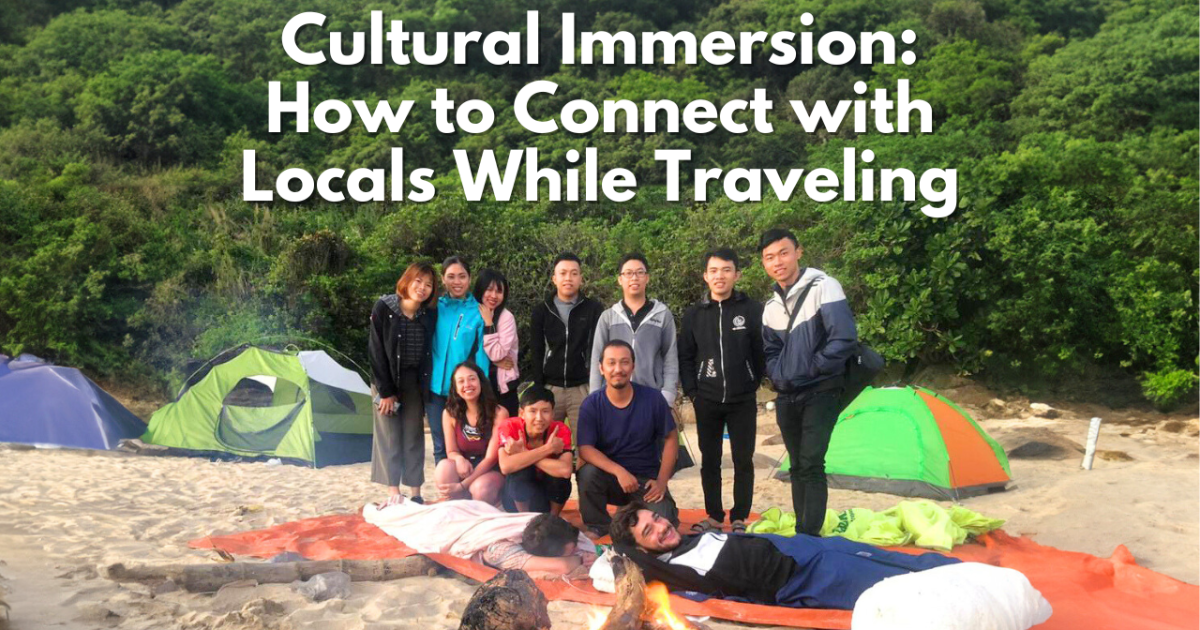Cultural travel offers a deeper, more meaningful connection with the places you visit. Rather than just exploring landmarks and tourist attractions, immersive cultural travel focuses on experiencing the day-to-day life, traditions, and practices of the local people. It’s about stepping outside the tourist bubble and forming genuine connections with communities around the world. This guide provides valuable tips for travelers who wish to engage more meaningfully with local cultures and communities.
What Is Immersive Cultural Travel?

Immersive cultural travel involves engaging with the culture of a destination on a personal and intimate level. It’s not about observing from a distance; it’s about becoming part of the environment and learning about the local way of life through interaction, participation, and shared experiences. Whether it’s staying with local families, learning traditional crafts, participating in festivals, or volunteering in community projects, immersive travel deepens the connection between travelers and the communities they visit.
Why Immersive Cultural Travel Matters
Cultural travel enriches your journey by broadening your understanding of the world. When you immerse yourself in the culture of a destination, you gain insights into how local people live, think, and celebrate. Additionally, engaging with local communities benefits the locals by promoting sustainable tourism, supporting local economies, and preserving cultural traditions.
Benefits of Immersive Cultural Travel
- Enriching Experience: Experiencing a new culture firsthand is far more enriching than a superficial visit to a popular tourist site.
- Personal Growth: Engaging with people from different backgrounds challenges your perspective and enhances your empathy and adaptability.
- Promoting Sustainable Tourism: Immersive cultural travel often emphasizes responsible tourism, which supports the local community and reduces the negative effects of mass tourism.
Also Read : 10 Best Places In Brisbane For This Summer Vacation
Tips for Connecting with Local Communities
If you’re looking to make your travel experience more immersive and meaningful, here are some valuable tips for connecting with local communities during your trip.
1. Learn the Local Language
One of the best ways to connect with a community is by speaking the language. Even if you’re not fluent, making an effort to learn a few key phrases can go a long way in building rapport. Greeting people in their native language and expressing interest in learning their culture shows respect and can open doors to authentic interactions.
Key Phrases to Learn:
- Greetings: “Hello,” “Good morning,” “How are you?”
- Polite Expressions: “Please,” “Thank you,” “Excuse me”
- Cultural Questions: “Can you tell me about your traditions?” or “What is special about your community?”
Learning the local language, even at a basic level, can lead to deeper connections and a better understanding of the culture.
2. Stay with Locals
Staying in locally owned accommodations like guesthouses, homestays, or Airbnb rentals can provide a more immersive experience compared to staying in large, international hotels. This allows you to interact with local hosts, hear their stories, and get insider knowledge about the culture and customs of the area.
Benefits of Staying with Locals:
- Cultural Exchange: You get to converse with people who live the culture daily, offering you an authentic experience.
- Access to Hidden Gems: Locals often know the best spots that aren’t mentioned in guidebooks.
- Personalized Experience: Your hosts can provide tailored recommendations based on your interests.
3. Participate in Local Events and Festivals

Festivals are often the heart of a culture, offering a unique opportunity to witness local customs, traditions, and art forms. Whether it’s a religious celebration, harvest festival, or a music and dance event, participating in these events gives you a deeper understanding of the community’s values and beliefs.
Also Read : The 10 Best Places To Explore In Portugal
How to Find Local Festivals:
- Ask Locals: Your hosts or fellow travelers may know about upcoming festivals and events.
- Check Social Media: Local tourism boards and cultural organizations often post event information.
- Look for Community Boards: Many small towns and villages have public notice boards with information on upcoming local events.
Attending and participating in these cultural events can help you bond with local people and enhance your travel experience.
4. Support Local Artisans and Small Businesses
When traveling, make a conscious effort to purchase handmade goods from local artisans and support small, locally owned businesses. This helps boost the local economy and promotes sustainable practices by ensuring that money stays within the community.
Also Read : 10 Mind-Blowing Hotels That Redefine Luxury Travel
Where to Shop:
- Markets and Craft Fairs: These often showcase local artisans and offer unique, handmade items.
- Local Restaurants and Cafes: Support small, family-run eateries for an authentic taste of local cuisine.
- Workshops and Classes: Participate in cooking classes, pottery workshops, or art lessons to learn about the craft and directly support local artisans.
By investing in local crafts, foods, and experiences, you not only bring home unique souvenirs but also contribute to the well-being of the community.
5. Volunteer or Contribute to Community Projects
Volunteering during your trip is an excellent way to give back to the community you’re visiting. Many organizations offer opportunities for travelers to help with educational, environmental, or humanitarian projects. This kind of engagement allows you to see the local way of life from a different perspective and makes a positive impact on the community.
Types of Volunteering Opportunities:
- Environmental Conservation: Help preserve local landscapes, wildlife, or natural resources.
- Teaching and Education: Volunteer in schools or community centers to help children learn or share skills.
- Community Development: Assist in building infrastructure, providing medical aid, or supporting local initiatives.
Make sure to research reputable organizations to ensure that your efforts are truly benefiting the community.
6. Be Respectful and Open-Minded
When immersing yourself in a new culture, respect for local customs, traditions, and people is key. Keep an open mind and avoid making judgments based on your own cultural norms. Approach interactions with humility, curiosity, and a willingness to learn.
Also Read : 10 Stunning National Parks You Need To Explore
Tips for Cultural Respect:
- Observe Local Customs: Follow local dress codes, dining etiquette, and other social norms.
- Ask Questions: Show genuine interest in the culture by asking locals about their way of life, traditions, and beliefs.
- Avoid Stereotyping: Recognize that every community is diverse and that no single person represents an entire culture.
By being respectful and open-minded, you’ll forge meaningful relationships and avoid unintentionally offending locals.
7. Practice Sustainable Travel Practices

Immersive cultural travel also means being mindful of your environmental and social impact. Practice sustainable tourism by minimizing waste, conserving water, and respecting nature. Support eco-friendly tours and engage in responsible activities that help preserve the cultural and environmental heritage of the destination.
Sustainable Travel Tips:
- Pack Light: Reducing luggage helps minimize your carbon footprint.
- Support Eco-Tourism: Look for organizations that prioritize environmental protection.
- Respect Wildlife: Don’t disturb wildlife and always follow ethical guidelines when interacting with animals.
By adopting sustainable travel practices, you ensure that future generations can experience the same cultural richness that you enjoy today.
Also Read : Family Travel Made Easy: Tips For Stress-free Vacations With Kids
Conclusion
Immersive cultural travel is a transformative way to explore the world and build meaningful connections with local communities. By learning the local language, staying with locals, participating in festivals, supporting small businesses, volunteering, and practicing respect and sustainability, you can create an enriching travel experience that goes beyond the typical tourist journey. These tips not only enhance your personal growth but also contribute positively to the communities you visit, promoting responsible and sustainable tourism practices.
Frequently Asked Questions (FAQs)
1. How can I prepare for immersive cultural travel?
To prepare, research the local culture, customs, and language of the destination. Be open to learning, respect local norms, and have an attitude of humility and curiosity.
2. What are the benefits of staying with locals while traveling?
Staying with locals gives you direct access to the culture, offers a more personalized experience, and allows you to support small businesses while creating lasting connections.
3. How do I find local cultural festivals?
You can ask locals, check social media for event announcements, or visit local tourism boards for a calendar of cultural events and festivals.
4. Is it safe to volunteer in another country?
Volunteering can be safe if you choose reputable organizations that have experience in responsible volunteer management. Always research the programs and ensure they align with ethical practices.
5. What should I avoid when traveling to a new culture?
Avoid making assumptions or judgments based on your own cultural background. Respect local customs, be mindful of your impact, and always seek to learn rather than impose your beliefs.





